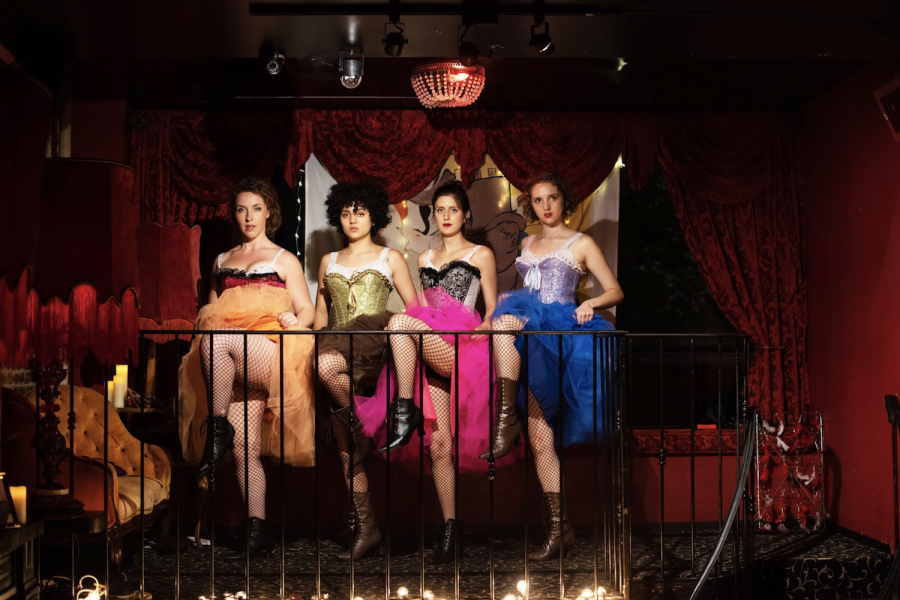Crammed together along crimson-red couches in a dimly-lit upstairs lounge at the Greenwich Village bar Madame X, audience members are invited to behold the tragic, yet intriguing life of the famous late-19th century French painter Henri Toulouse-Lautrec in a performance titled “Unmaking Toulouse-Lautrec” by Bated Breath Theatre Company.
The show is set in a Moulin Rouge-inspired cabaret. Face to face with the bodies of the cast, the show strings the audience along through a series of intense, amusing and provocative vignettes, which result in a fun but somewhat confusing and disjointed performance.
The play begins with a funeral scene. Immediately, the audience is made aware of Toulouse-Lautrec’s impending death, which is revisited at the end of the performance. But despite the somber scene that sets the show in motion, Bated Breath Executive Artistic Director Mara Lieberman says that the performance isn’t supposed to be sad. Rather, she would describe it as a sexy and fun experience.
As the actors remove their black funeral capes and the sound of thunder that plays throughout the funeral goes quiet, the life of Toulouse-Lautrec, played by Daniel George, resets and the audience is guided through his troubled childhood.
“Our early child influences go on to influence the rest of our lives and maybe our death,” Lieberman said in an interview with WSN.
Although it’s almost uncomfortable to watch, the Bated Breath actors relay the story of Toulouse-Lautrec’s conception through a sensual scene between the two actors who play his parents, Luke Couzens and NYU alumna Derya Celikkol. They realize that Toulouse-Lautrec’s mother Adele is pregnant, however, his father declares that they have “produced genetically inferior offspring,” as his parents are first cousins.
Toulouse-Lautrec is born, and the subsequent vignettes tell the story of how he fractured both of his femurs between the ages of 13 and 14. The injuries never healed properly, leaving Toulouse-Lautrec with a lifelong disability, which doctors at the time attributed to a genetic disorder possibly caused by his parents’ being so closely related .
“We talked about since Henri was differently abled and kind of considered an outcast,” said Glori Dei Filippone, who plays Yves in the performance and who also graduated from NYU last May. “He was treated like, as you know, how you sort of treat service workers, where it’s like they’re there, but you act like they’re not. So you’re able to talk and do things in front of them and see them as kind of like wallpaper.”
Throughout the rest of the performance, the audience follows Toulouse-Lautrec as he becomes inspired to start painting and eventually spirals into alcoholism. “He was both a painter and an aristocrat, but more comfortable with prostitutes,” Leiberman explains in reference to Toulouse-Lautrec.
The vignette style allows the audience to learn about every stage of Toulouse-Lautrec’s life, but it can also lead to jarring narrative shifts. At one point in the show, the cabaret dancers are seen mocking Toulouse-Lautrec, calling him a “little monster.” The following vignette tells a different story, however, as one of the dancers exclaims that she loves one of his drawings of her, only to be followed by the next scene where all of the dancers are horrified by his paintings.
The show, which was originally conceived and directed by Lieberman back in 2012, premiered at the Wadsworth Atheneum, a museum in Hartford, Connecticut. Originally running only 26 minutes, Lieberman adjusted the show to fit the new venue and cast, as well as extending the performance to be a 55-minute-long experience.
The new rendition began on May 8 and is now continuing into its third extension through Oct. 30. Tickets can be purchased online with dates available for alternating Fridays (7 p.m and 8:30 p.m.) and Wednesdays (7 p.m. and 9 p.m.). Prices are $25 for bar/standing room and $45 for general admission.
A version of this article appears in the Monday, Sept. 9, 2019 print edition. Email Madeline Lyskawa at [email protected].

























































































































































